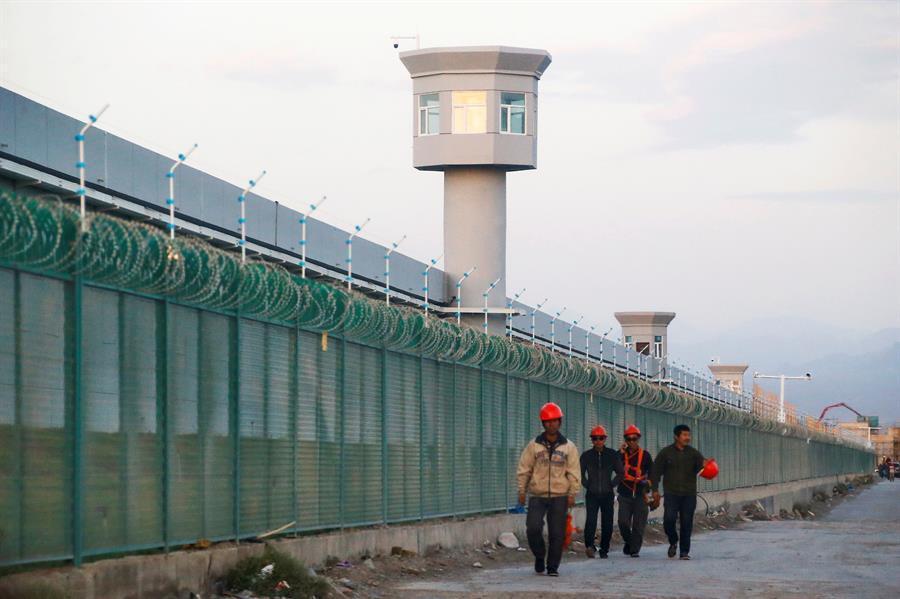Trump OKs bill to punish China over Uighur ethnic crackdown
WASHINGTON- The Associated Press

President Donald Trump signed legislation on June 17 that seeks to punish China for a crackdown on ethnic minorities, even as a new book by former national security adviser John Bolton said the American leader expressed support for the brutal campaign in a private conversation with his Chinese counterpart.
The Uighur Human Rights Policy Act of 2020 passed with overwhelming support from Republicans and Democrats in Congress. Trump signed it with no ceremony, issuing a statement in which he said a sanctions provision intruded on executive authority and he would regard it as non-binding.
Still, Uighur activists see the approval as an important step. It is the first time any government has sought to punish China for a campaign of mass surveillance and detention of Uighurs and other mostly Muslim ethnic groups in the western Xinjiang region.
“Globally this should be a model for other counties who have been very lukewarm in their response to the ongoing atrocities in the Uighur region," said Nury Turkel, a Uighur activist and member of the U.S. Commission on International Religious Freedom.
The bill, which includes sanctions on Chinese officials directly involved in the crackdown, was expected to further inflame already tense relations with China amid the Trump administration’s criticism of Beijing’s response to the outbreak of the coronavirus.
The signing came as Secretary of State Mike Pompeo was meeting in Hawaii with a senior Chinese diplomat, and as revelations from the soon-to-be-released Bolton book were emerging.
The former national security adviser said Trump asked at a White House Christmas dinner in 2018 why the U.S. wanted to sanction China over the treatment of the Uighurs, who are ethnically and culturally distinct from the country’s majority Han population and are suspected by the Chinese government of harboring separatist tendencies.
Bolton wrote that at the opening dinner of the Osaka G-20 meeting in 2019, with only interpreters present, Chinese President Xi Jinping explained the Chinese campaign to Trump.
“According to our interpreter, Trump said that Xi should go ahead with building the camps, which he thought was exactly the right thing to do," Bolton wrote.
Bolton said another National Security Council official, Matthew Pottinger, told him Trump had made a similar remark during his 2017 trip to China, "which meant we could cross repression of the Uighurs off our list of possible reasons to sanction China, at least as long as trade negotiations continued.”
Trump issued a statement upon signing the legislation Wednesday that the new law would hold “perpetrators of human rights violations” accountable.
Members of Congress intended the legislation to increase pressure on China over the crackdown in Xinjiang, where authorities have detained more than a million people _ from ethnic groups that include Uighurs, Kazakhs and Kyrgyz _ in a vast network of detention centers. Many have been subjected to torture and forced labor and deprived of adequate food and medical treatment.
The law would impose sanctions on specific Chinese officials, such as the Communist Party official who oversees government policy in Xinjiang. Trump said in his signing statement that a provision dictating when sanctions could be terminated interfered with executive authority and would be considered non-binding.
Even with the signing statement, Turkel said the measure is “still an effective legal mechanism to address human rights abuses” and he thanked members of Congress for their support.
Sen. Jeff Merkley, a co-sponsor of the legislation, said the act requires the secretary of state to determine whether individuals responsible for “appalling human rights violations” meet the criteria for sanctions. "The United States cannot remain silent in the face of these atrocious and horrifying abuses,” the Oregon Democrat said. “As millions of Americans fight for racial justice here at home, we must also stand strong as a champion of human rights abroad.”
The legislation also requires the U.S. government to report to Congress on the human rights violations in Xinjiang as well as China’s acquisition of technology used for mass detention and surveillance. It also requires American authorities to look into the pervasive reports of harassment and threats of Uighurs and other Chinese nationals in the United States.
China has publicly brushed away criticism of its crackdown in Xinjiang, which it launched in 2014 as the “Strike Hard Against Violent Extremism” campaign in the vast resource-rich territory in the far northwest of the country.
















